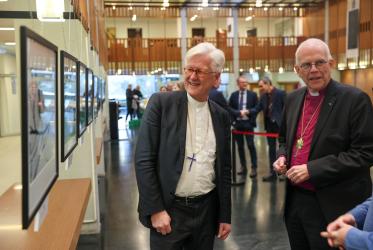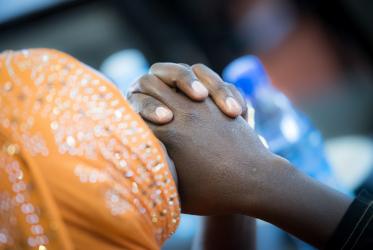Address presented at the Workshop on Lasting Peace in Africa, in Kigali, Rwanda,
16 April, 2004
I am delighted to have the opportunity to participate in this important workshop,
to learn from you and discuss with you the role of religion in conflicts and
gross human rights violations.
Thank you in particular for the experience yesterday afternoon and the visit to
the Ntarama Memorial. To visit the site and begin to better understand the pain
of the Rwandan genocide I consider a great privilege.
I come from a very different background, compared to most of you. While Africa
is a continent with a strong and active religious life, my home country Sweden
is probably one of the most secularized countries in the world. At the time
Christianity came to Rwanda - 100 years ago - Sweden began its transfer into a
modern and secular society, where the role of the churches and the role of religion
were marginalized for a period of time.
However, in both our contexts we can see an increased role of religion in politics.
In the case of Sweden it can be described as a transfer from a post-Christian to a
post-secular society. Unlike many European countries, Africa has the advantage
and the disadvantage to meet the challenges of the trans-modern society, without
the experience of deep-going processes of secularization.
Religion is normally not the source of conflict. However, depending on how religion
is used or misused, religion can either de-escalate and help the conflict to
be solved in a constructive way, or fuel the conflict, make it deeper, more violent
and more difficult to solve.
For the individual believer, religion is a single totality, but when reflecting on its
political impact it can be helpful to explain the phenomenon of religion by classifying
it according to its different forms of expression:
1. Religion as spiritual experience. In this aspect there are only very slight
differences between the world religions - Christianity, Judaism, Islam, Buddhism
and Traditional religion.
2. Religion as theology. In the past there were great differences between the
major religions in this area, but in recent years they have moved towards a deeper
common understanding.
3. Religion as ethics and values. In this area there are much smaller differences
between the religions than the individual believer and general public might think.
For example, the three monotheistic religions have a similar basis for the ethics
of economic management and how to put one's gifts to good use - ideas about
social justice, about the individual's responsibility for his or her neighbour and
the global neighbourhood. In broad terms they all share the view that the earth
can provide "enough for everyone's need but not for everyone's greed".
4. Religion as a bearer of culture. This is the area where the greatest differences
are to be found, not only between the world religions, but also within them.
This aspect of religion is also increasingly important as the underlying cause of
conflict - or as a tool easily manipulated in order to stir them up.
The two last-mentioned roles of religion - as an upholder of ethics and a bearer
of culture, are the aspects of religion that are not only the concern of the individuals,
the churches and religious organizations. I believe these aspects to be the
concern of the whole society and that it is absolutely necessary to bring them into
the decision-making and political processes of our societies.
The fundamental transformations taking place in our societies mean that it is
more urgent than ever to understand the role of religion in political processes.
National change and global exchange have led to economic development of considerable
magnitude. As millions of people leave extreme poverty behind, this
potential offers hope to many of the world's poor. Old structures of power are
forced to change.
Simultaneously, however, new patterns of exclusion and inequality have appeared,
with marginalization, insecurity and powerlessness as real consequences for many
people. Such a situation may generate feelings of social and cultural insecurity.
Africa is the continent that is worst off in this respect.
These transformations in society also change the role of the nation-state. It would
seem that the very rhythm and scale of the transformation exceed the capacity of
national governments and policies to shape and influence the process.
We have a global economy. But the legal, moral or democratic framework vital
to an economy if it is to be able to serve the common good continues to be a basically
national responsibility.
In the trans-modern, economic and political context, the main ideologies of the
so called modern 20th century - Marxism as well as liberal capitalism - have lost
power as well as credibility. The nation-state, as the main framework for identity,
according to these ideologies, has become significantly weaker. Failed states
are one of the most urgent security concerns in today's international affairs.
The nation-state is not going to disappear. It will remain the most important
political instrument in the foreseeable future. But global interdependence makes
it increasingly difficult for the nation-state alone to deliver what people expect
for a good life. This is a fact in both the northern and the southern hemisphere.
Consequently, people will look for supplementary communities with which they
can identify, both larger and smaller than the nation-state. But people will also
turn inwards. Cultural factors - such as ethnicity and religion - will be more
important in people's search for fundaments on which to build their hopes for the
future. Socially and politically marginalized young people, who 30 years ago
turned to Marxism in their search for a better future, might today turn to religion.
Africa, with 2,600 ethnic groups and where colonial powers have injected
mistrust and unrest for centuries, is particularly complex and challenging in this
respect.
We know - both from history and contemporary experience - that religious influence
on politics can be both beneficial and detrimental. Religious-political conflict
is not a new phenomenon. Let me focus on three examples:
1. Historically, the role of religion in political conflicts has been to increase
tension - even cause clashes - between civilizations. This can only happen if
religion is used by political leaders to emphasize the exclusiveness and primacy
of one particular group at the expense of others - be it Christian, Jewish,
Muslim or some other religious faith. It is necessary for all actors - in particular
churches and ecumenical organizations - to counteract all such monocultural
political tendencies and prove that the Samuel Huntington theory of
an inevitable clash between civilizations is part of an outmoded way of thinking.
2. In modern societies, in particular in confrontation with the modern ideologies
of the 20th century, religious/political friction has mainly occurred between
clerical and secular authorities. Basically this is a healthy conflict which has
helped - and continues to support - the development of universal social values
in modern society, for example, pluralism, democracy and human rights.
It has also clarified the different role and relations between church and state.
3. As a consequence of the transformation taking place in our societies, a third
kind of religious/political clash has become more evident in recent years both
in domestic and international politics. This is the split within religions and
cultures. A split between "fundamentalists", who see their traditional scriptures
and teachings as so absolute as to divide humankind into irreconcilable
believers and infidels, and others, who see their ancient traditions or spiritual
insights as raw material for wider human reconciliation, as the basis for an
intensified search for community among people of differing races, creeds and
national origins.
The clash between cultural provincialism and openness is evident in all cultures
and must be addressed with a forward-looking attitude.
If religion is used as an instrument to gain political power and emphasize the
exclusiveness and primacy of one's own group at the expense of others, it will be
a most destructive contribution. The political idea of "the otherness" fuels conflicts.
On the other hand,
by emphasizing fundamental ethics and humanity,
by giving voice to the voiceless,
by emphasizing the responsibility of the individual,
by focusing on inclusiveness and a deeper sense of hope,
by highlighting the importance of the meeting of cultures,
by being ecumenical,
religion will make a much-needed and constructive contribution to our societies.
In light of this, it is of growing importance for the ecumenical movement to work
with member churches and to handle this split; to stimulate an inclusive understanding
of the role of faith and to vaccinate against an exclusive understanding
of themselves.
At the time of the Rwandan genocide I was serving as P.A. to a bishop in the
Church of Sweden and with very little connection to the WCC. I have talked to
colleagues involved at that time and they all say that we did not do enough in
time. After the tragedy, a lot of efforts have been made. However, when there still
was time
This is an in-built dilemma for a membership organization like the WCC. When
member churches invite, encourage or give support, there is a potential for a strong
action. Like with the US churches during the war on Iraq. Like with South Africa
in the struggle to end apartheid. Like in Sudan and the struggle for a peace agreement.
However, when the churches are divided, when they oppose action from outside
or when they are part of the problem, the space for action is very limited.
This was the case in relation to communist countries in Central and Eastern Europe
during the Cold War. This is the case with Zimbabwe today.
This dilemma needs to be further addressed. The more difficult the situation, the
more important is the action and involvement from the ecumenical movement.
The WCC and the ecumenical movement is not only accountable to its member
churches, but also to the people in these churches and to the principles of justice,
peace and human rights that have been developed through its history.
This is why criticism of the role of the WCC and the ecumenical movement before
and during the genocide is important. Not to blame, but to help to develop principles
and criteria on how to act in situations when action is needed but when the
local churches are not ready or not in consent with the action needed.
I would therefore like to hear your comments on the role of the ecumenical movement
in situations of great risk of major violations of human rights.
My experience tells me that it is particularly in the beginning of a conflict or at
the end where the churches are mainly able to make constructive contributions.
The closer we are to the peak of the conflict, the more difficult it is to find a relevant
response.
The UN Charter gives governments and intergovernmental organizations clear
measures of conflict prevention (Eliasson ladder):
- Early warning, verbal actions
- Fact-finding by UN or regional organization
- Stimulate parties to use different measures
- Peace keeping
- Sanctions
- Threat of force, on the basis of Chapter VII
- Use of force, on the basis of Chapter VII
The ecumenical movement could look for a similar structured approach to make
the best possible use of our instruments - statements, pastoral visits, stimulate
churches to act, fact finding, dialogue with governments, advocacy campaigns,
interaction with the UN, etc.
Although it is clear that the WCC could have done more before and during the
Rwandan genocide, it does not mean that such actions could have prevented the
genocide. A similar reflection is valid for the churches in Rwanda.
To answer that question, it is necessary to understand why genocides take place.
In literature and public debate, referring to the genocides of the 20th century -
Armenian, Holocaust, Khmer Rouge and Rwanda - there are in particular three
themes of explanations given. They relate to war, governance and ideology.
Genocides take place during war or in immediate connection with war. Preventing
wars also means preventing genocides.
Genocides are carried out by non-democratic or semi-democratic regimes. Preventing
genocides means long-term investment in democratic culture, including minority
rights, legitimacy, independent judiciary, independent media, etc.
Genocides are based on exclusive ideologies, dividing "us" from "them". Preventing
genocides is about promoting tolerance.
All these themes are at the core of the ecumenical movement and the member
churches. If we were to take them even more seriously, it would of course make
a difference.
If it would have been enough to prevent the Rwandan genocide we cannot know.
But it would have been enough to save many individuals and to avoid the painful
question: Where were the churches during the genocide?
Thank you.
Peter Weiderud
Director, CCIA




